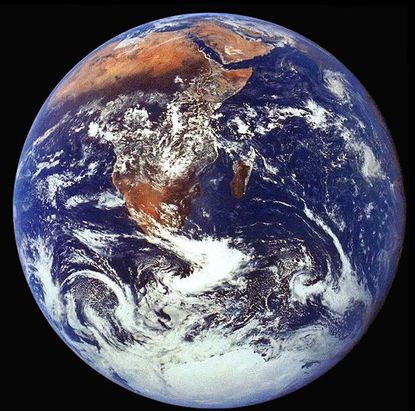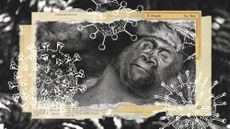Life on Earth might be way older than we thought

Scientists have long theorized about the origins of life on Earth. But thanks to new research from England's University of Bristol, there are some new clues to factor into the question of how our world came to be.
For a long time, our best bet at figuring out when life developed on our home planet was to analyze fossils, the earliest of which gave us evidence of life as old as 4 billion years ago. But in a study published Monday in the journal Nature Ecology & Evolution, scientists posit that life may be up to hundreds of millions of years older than that.
Researchers took a closer look at the fossils we've already discovered — namely, their DNA, Phys.org reported. They analyzed genetic data until they were able to build a theoretical timeline of when life evolved into those organisms. From there, they traced ancient microbes' lineage to a "Last Universal Common Ancestor" of all life, or "LUCA," said study co-author Davide Pisani. The data found through that DNA is much more reliable than fossil evidence alone in proving evolutionary links, said the study's lead author, Holly Betts.
Subscribe to The Week
Escape your echo chamber. Get the facts behind the news, plus analysis from multiple perspectives.

Sign up for The Week's Free Newsletters
From our morning news briefing to a weekly Good News Newsletter, get the best of The Week delivered directly to your inbox.
From our morning news briefing to a weekly Good News Newsletter, get the best of The Week delivered directly to your inbox.
Around 4.5 billion years ago, Earth was impacted by another planet called Theia, Metro explained. This collision "sterilized" Earth and sent a chunk of space rock hurtling into orbit around us — what we now know as the moon. Per the scientists' findings, it wasn't long after that that the "LUCA" originally lived.
Although that might be the origin of life on Earth, it's worth noting that the branch of the evolutionary tree that led to humans is much, much younger. "We belong to a lineage that is billions of years younger than life itself," Pisani explained. Read more about these new discoveries at Metro.
Sign up for Today's Best Articles in your inbox
A free daily email with the biggest news stories of the day – and the best features from TheWeek.com
Shivani is the editorial assistant at TheWeek.com and has previously written for StreetEasy and Mic.com. A graduate of the physics and journalism departments at NYU, Shivani currently lives in Brooklyn and spends free time cooking, watching TV, and taking too many selfies.
-
 Why Man United finally lost patience with ten Hag
Why Man United finally lost patience with ten HagTalking Point After another loss United sacked ten Hag in hopes of success in the Champion's League
By The Week UK Published
-
 Who are the markets backing in the US election?
Who are the markets backing in the US election?Talking Point Speculators are piling in on the Trump trade. A Harris victory would come as a surprise
By The Week UK Published
-
 Crossword: November 3, 2024
Crossword: November 3, 2024The Week's daily crossword
By The Week Staff Published
-
 Has the Taliban banned women from speaking?
Has the Taliban banned women from speaking?Today's Big Question 'Rambling' message about 'bizarre' restriction joins series of recent decrees that amount to silencing of Afghanistan's women
By Harriet Marsden, The Week UK Published
-
 Cuba's energy crisis
Cuba's energy crisisThe Explainer Already beset by a host of issues, the island nation is struggling with nationwide blackouts
By Rebekah Evans, The Week UK Published
-
 Putin's fixation with shamans
Putin's fixation with shamansUnder the Radar Secretive Russian leader, said to be fascinated with occult and pagan rituals, allegedly asked for blessing over nuclear weapons
By Harriet Marsden, The Week UK Published
-
 Chimpanzees are dying of human diseases
Chimpanzees are dying of human diseasesUnder the radar Great apes are vulnerable to human pathogens thanks to genetic similarity, increased contact and no immunity
By Harriet Marsden, The Week UK Published
-
 Deaths of Jesse Baird and Luke Davies hang over Sydney's Mardi Gras
Deaths of Jesse Baird and Luke Davies hang over Sydney's Mardi GrasThe Explainer Police officer, the former partner of TV presenter victim, charged with two counts of murder after turning himself in
By Austin Chen, The Week UK Published
-
 Quiz of The Week: 24 February - 1 March
Quiz of The Week: 24 February - 1 MarchPuzzles and Quizzes Have you been paying attention to The Week's news?
By Sorcha Bradley, The Week UK Published
-
 Will mounting discontent affect Iran election?
Will mounting discontent affect Iran election?Today's Big Question Low turnout is expected in poll seen as crucial test for Tehran's leadership
By Sorcha Bradley, The Week UK Published
-
 Sweden clears final NATO hurdle with Hungary vote
Sweden clears final NATO hurdle with Hungary voteSpeed Read Hungary's parliament overwhelmingly approved Sweden's accession to NATO
By Peter Weber, The Week US Published